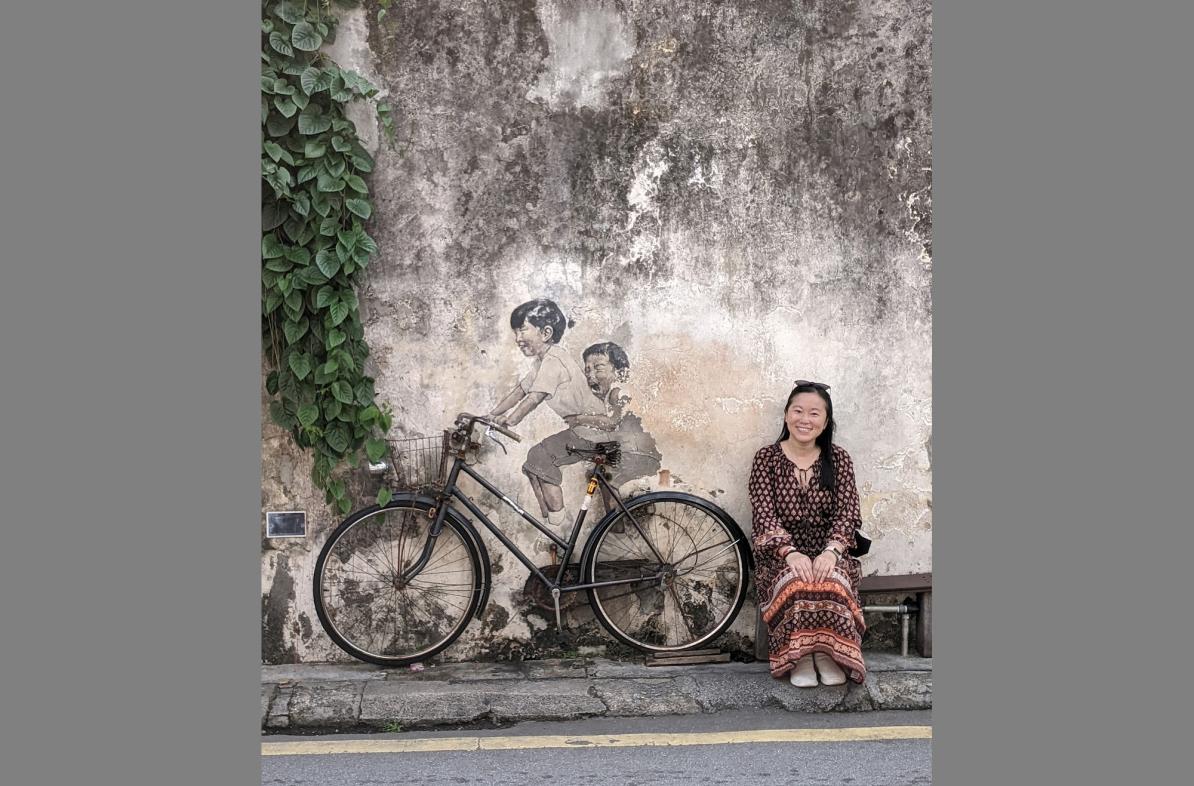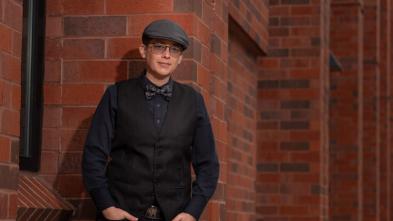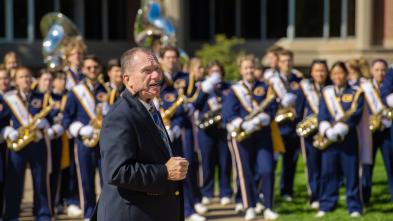
Fulbright Scholar finds new opportunities, inspiration in Malaysia during summer of research and teaching
When Dr. Kaishan Kong returns to the University of Wisconsin-Eau Claire campus this fall, the associate professor of languages will bring with her plenty of new ideas for tweaking her courses so her students can more easily connect with people and communities near home and around the globe.
As a Fulbright Scholar, Kong spent three months in Malaysia this summer, an “invaluable and transformative experience” that she says is inspiring her to make her UW-Eau Claire language courses more focused on community service and building connections with people outside the university.
“I observed a combination of cultures within Malaysia, and my experience reminds me of the importance of inclusivity and diversity,” says Kong, who spent her summer at Taylor’s University, one of the top private universities in Southeast Asia and a partner university to UW-Eau Claire. “Now, I want to help my students foster their civic duties to apply their knowledge to help local communities.”
Kong is “incredibly impressed” by the community-based learning at Taylor’s University. The university has Impact Labs that connect students with the United Nations’ 17 Sustainable Development Goals, but it also has small class projects that engage students with local communities, she says. For example, the campus has a book series project that involves students in various academic programs writing books to share stories about and with different communities, such as nursing homes and refugee shelters. She was so intrigued by the program that she wrote a paper about it, she says.
This fall, Kong will launch an international pen pal program to connect her students in UW-Eau Claire’s Chinese program with students at Taylor’s University in Malaysia. Similar projects she’s led in the past to connect Blugolds with international students from China have been successful. So, she now wants to bring together her UW-Eau Claire students with their peers in Malaysia.
Hopefully, Kong says, the new pen pal initiative will be one of many Fulbright-inspired programs that will connect Blugolds with students, faculty and other people in Malaysia.
“Multiple universities already have expressed an interest in working with UWEC in exchange programs and teaching collaborations,” Kong says. “I hope to be a bridge to connect and support these ideas.”
Since arriving in Malaysia, Kong has kept a journal to record and reflect on her day-to-day experiences. Her notes, she says, will help as she shares her experiences, observations and ideas with the UW-Eau Claire campus community through a series of presentations, conferences and publications.
A new Fulbright experience
Kong was awarded a Fulbright Scholarship in 2020, a program that was to take her to China. However, COVID-19 and other factors caused the China program to cancel.
Fortunately, Kong was able to shift her teaching and research focus to Malaysia, where she is spending the summer at Taylor’s University, a college that already has some ties to UW-Eau Claire. Students in the university’s American Degree Program transfer to several U.S. universities, including UW-Eau Claire.
“I feel fortunate to launch my Fulbright project in Malaysia because my original Fulbright proposal about promoting intercultural competence in Asia also applies to the context in Malaysia,” Kong says. “In fact, Malaysia is famous for its multilingualism and multiculturalism. This unique setting is perfect for my research and teaching.”
Kong says she’s “fortunate and privileged” to be in Malaysia, part of a program that appeals to her for many reasons, including her interest in intercultural competence. She hopes to learn about others’ perceptions and practices of intercultural competencies beyond the U.S. educational setting.
“The best way to gain these insights is to have ethnographic research in the target culture,” Kong says. “So, during my time here, I am very observant of things like people’s interactions and multilingual road signs, and I have participated in all kinds of activities offered to me.”
In Malaysia, Kong teaches an English composition course for students in the ADP program, gives guest lectures to various audiences, conducts research about intercultural competence in the country and plans future collaborations with Malaysian educators.
Originally from mainland China, Kong brought her knowledge to the United States as she developed her career teaching in higher education. During her years in the U.S., she’s gained “tremendous knowledge and skills,” which she is sharing with students in Malaysia this summer.
“I hoped to return to Asia and contribute what I learned here in the U.S. to benefit students there,” Kong says of Malaysia. “This opportunity brings me full circle.”
Growing personally and professionally
The Fulbright program is a tremendous opportunity to grow personally and professionally, Kong says.
Personally, she was eager to embark on an “international journey to observe my own intercultural adaptation,” says Kong, who completed her K-12 and undergraduate college education in China before earning a master’s degree in intercultural communication in the United Kingdom and a doctorate in second languages and cultures education in the U.S.
A member of UW-Eau Claire’s faculty since 2014, Kong has established the study of Chinese language and culture as an important component within the languages department and the wider university. Her efforts led to the creation of a certificate program in Chinese language study at UW-Eau Claire.
Kong, who regularly includes students in her research, is known as an outstanding mentor, says Dr. Carter Smith, professor of languages and chair of the languages department.
“Dr. Kong, from her first semester here at UWEC, has worked tirelessly to share her love of the Chinese language and cultures with our students as well as those at UW-River Falls via the UW System Collaborative Learning Program,” Smith says. “She also has incorporated several UWEC students in student-faculty research grants to extend this outreach to an international level.”
Describing her summer in Malaysia as “my own study abroad experience,” Kong says it’s hard for her to believe how much she’s already done during her months in the country.
“I spent a lot of time getting to know the local communities, including Taylor’s University and the city where I stay, Sunway, and Kuala Lumpur,” Kong says. “After I knew my communities well and settled in, I started to travel to other cities. I went to Melaka and Penang by myself on weekends, two cities known for their food and rich cultures. I also will visit Ipoh and Singapore before returning to the U.S.”
Professionally, Kong has given more than 10 guest lectures to faculty and students at Taylor’s University. She also was invited by the largest university in Malaysia, Universiti Teknologi MARA (UiTM), to deliver two guest lectures. One of the lectures was livestreamed, so faculty and students from seven universities throughout Asia joined the discussion.
Embracing new experiences
One of the best parts of her time in Malaysia is that “every day brings a new experience,” Kong says.
Among the most powerful experiences she’s had so far was traveling with faculty and students from the university’s sociology department to visit a nongovernmental organization (NGO) in Kelantan, one of the least developed states in Malaysia.
“The local culture in Kelantan was a new experience even for my local colleagues from Taylor’s, so it was memorable as I got to experience this unfamiliar environment with them,” Kong says. “The NGO was dedicated to helping people with disabilities and underprivileged populations. We visited all the services they offered and even went on home visits with the medical volunteers.
“In the evening, we were very lucky to watch a very authentic Malaysian music performance called Dikir Barat. Although I didn’t understand a word and my colleagues translated for me, I was extremely engaged by their passion.”
While cultures are overarching architectures and literature, they also are everyday practices among people, Kong says.
“I think the everyday culture is what makes cultural exploration most exciting,” Kong says. “Being a reflective and adventurous visitor to Malaysia, I’ve gained more empathy, compassion, hope and responsibility to build bridges between cultures.”
The Fulbright-Malaysia office also organized an event called “Fulbright Malaysia’s Summer Soirée,” which Kong says was another highlight of her summer program.
The formal event brought together representatives from the U.S. embassy to Kuala Lumpur and the Ministry of Higher Education in Malaysia, with a goal of promoting international educational exchange between “two incredible countries,” Kong says. During the event, she met other U.S. Fulbright fellows and Malaysian Fulbright scholars who were preparing to study and engage in research in the U.S.
“The event was truly a beautiful reflection of intercultural bonding beyond national borders,” Kong says.
At the event, Kong was one of the three U.S. Fulbright Scholars invited to join a panel discussion to talk about her research, experiences and plans for sharing what she learned. It also was an honor to share a table with U.S. Ambassador to Malaysia Brian McFeeters, Kong says, adding that “I proudly introduced to him all the great things in UWEC and welcomed him to come for a visit.”
Still another highlight of being part of the Fulbright program is meeting scholars in varying academic disciplines and from different parts of the world, Kong says. For example, one evening she had dinner with new friends from China, the United Kingdom, the U.S., Malaysia and Singapore.
“I wanted to frame that moment because although we came from a variety of places and disciplines — sociology, criminal psychology, narrative reality, phenomenology, intercultural communication and language education — we were able to share our intercultural stories and our exciting scholarly work. That was a beautiful evening!”
You may also like


